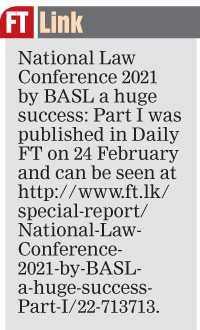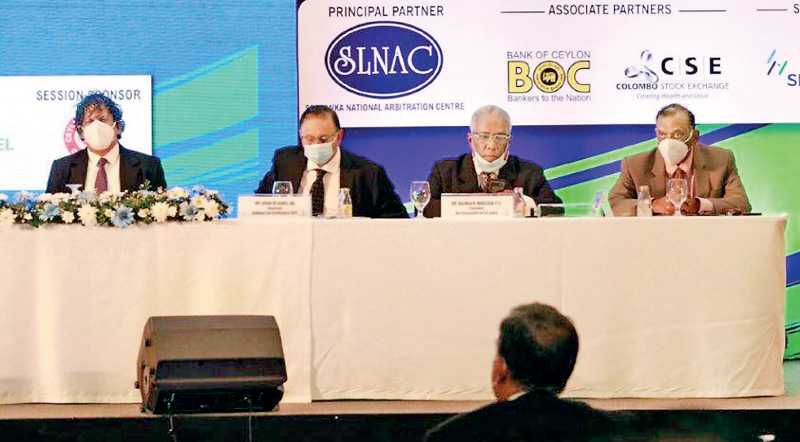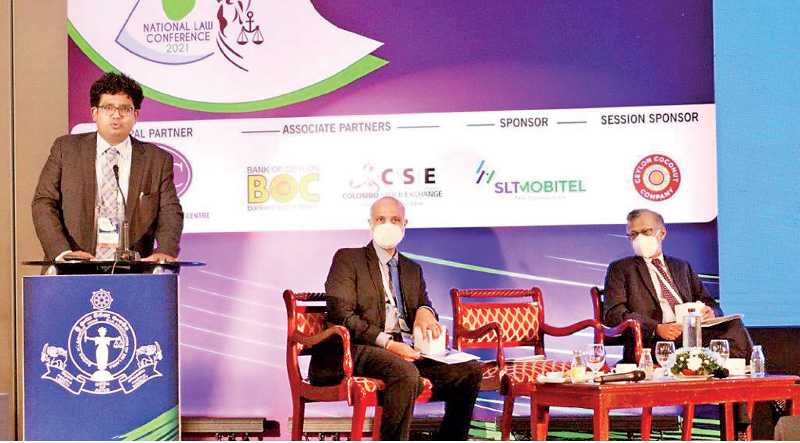Tuesday Feb 17, 2026
Tuesday Feb 17, 2026
Thursday, 25 February 2021 00:00 - - {{hitsCtrl.values.hits}}

By Hiruni Dabarera
The Bar Association of Sri Lanka organised its first hybrid National Law Conference on 12-13 February at the Galadari Hotel, Colombo. This year the conference focused on the theme ‘Futurism’ inspired by the Italian art students’ movement of the 1920s in an effort to envision the future of the legal profession and guide the law accordingly. Kicking off at a time the country is grappling with a pandemic, the conference addressed timely and dynamic topics with the participation of many legal and non-legal professionals. Excerpts from some of the sessions are as follows:
Sports Law, Contract, Betting, TV Rights and Sponsorship
The Sports Law, Contract, Betting, TV Rights and Sponsorship session revolved around the malpractices that exist with sports gaining huge popularity as a medium of entertainment in recent times and how laws apply to tackle them. Experts in the field of TV Rights and Sports law like Dinal Phillips PC and Sumathi Dharmawardhana PC shared their knowledge on this subject area.
Match fixing and spot fixing, which are common practices in cricket, a highly popular and lucrative sport especially in the South Asian region were also addressed. Cases of Mohommad Azrudhdhin who was an Indian cricketer and Mervyn Westfield who was an English cricketer were spoken about and the consequences they had to face due to match fixing were shared with participants.
The session also had Sri Lanka’s much loved and respected cricket player Kumar Sangakkara sharing his insights on what the future of cricket is and the areas that needs to be addressed within the sport. He stated that one of the most important discussions that have been at the forefront is the future of test cricket in terms of balancing its interest with franchise cricket. The ICC is not an independent body and it is made up of membership of home boards, hence its interest lies in maintain their health and in balancing their interests with growth of international cricket. Top quality international players have taken early retirement; have had clashes with the board regarding availability to play in franchise cricket due to its growing popularity and becoming a highly lucrative form of sport. Hence, agreements are now made to balance out players’ interests and ambitions of the home board. Conflicts have arisen often which are now increasingly being addressed successfully.
Contracts in terms of international cricketers are structured correctly in Sangakkara’s view. The national contract takes precedence over any contract they sign in terms of franchise cricket. A specific no objection certificate is required to engage in franchise cricket by players. They are in force even after retirement. One of the focus points in future will be solving issues proactively. This should not be looked at only in regard to financial security of players but allowing for successful players to be retained for much longer in international cricket. It is the only way in which money will continue to come in. A central TV Rights fund is a good way forward, which has been proposed so that players will have preference and no conflict in playing for their country.
He further stressed how it difficult to note a spot-fixer. Match-fixings are fairly easier. However, he said that ICC and its anti-corruption and security unit has connections and they monitor not only players but also their bookies and their agents. They have records of illegal bookies on file and if players are in a particular hotel, their phone calls and movements and who their guests are monitored. They do their very best to prevent these from happening which is a new initiative. ICC tries to build their trust with the player so that reporting of it is done in a confidential manner. However, such malpractices are difficult to be completely eradicated, he stated.
Electronic Commerce and the Law
Dr. Kanag-Isvaran PC sharing his viewpoints on e-commerce stated how online contracts form an essential part of e-commerce. Accordingly, though goods displayed in a shop is considered as an ‘invitation to treat’, the description of a good in a web site cannot be considered as an offer. The potential buyer in fact makes the offer by asking for a product displayed online from the seller and he has the discretion to accept or reject it. The seller can accept the offer by delivery of the good or service or by confirming the order through email. This is considered to be an electronic transaction.
According to the PC, the Electronic Transactions Act No. 19 of 2006, amended in 2017 constitutes sufficient provisions to tackle new developments within e-commerce. It defines ‘Invitation to make offers’ and ‘legal recognition of electronic signatures’, recognises electronic contracts and also gives effect to the United Nations Convention on the use of electronic communications in international contracts. However, in the practice of e-commerce geographical and political borders are always crossed and hence choice of law for Internet disputes is an issue that needs to be addressed. This has not been sufficiently addressed even by developed nations at present. To solve this issue, the PC suggests the inclusion of a jurisdiction clause when contracts are made online that includes the law the court should apply and the forum to adjudicate on the matter.
e-commerce also poses problems in taxations, since when delivered physically goods are often subjected to rules on tariffs and customs duties. Further, at present a tax is not charged for services that are bought online like downloading software. Therefore, tax systems should provide clear, predictable and transparent obligations pertaining to goods and services under e-commerce and they must be charged neutrally without imposing an extra burden on goods or services subjected to traditional commerce.
In concluding remarks the PC stressed how in order to meet the rapid growth of e-commerce as a trade practice, and to accommodate to the changes it demands, Sri Lanka must be willing to relinquish some measures of sovereignty in exchange for the benefits of e-commerce and not allow for national laws or local regulations to obstruct this thriving trade practice.
Future of the Profession, Limited Liability Partnerships, Ethics, Electronic Transaction Act Applicability, Digital Documentation
Aritha Wickramanayake, Precedent Partner – Nithya Patners shared his thoughts on the future of the legal profession quite extensively. According to him the distinction between law and other areas are getting blurred with time, others constantly adopt their curriculum to changing times while this is slow within the legal profession. “We no longer claim exclusivity or knowledge in areas like tax law. Corporate law could be the next area to experience this,” he said. Hence, growth must be facilitated in new areas or other professions will fill the void and they will hold control over these.
Additionally, legal education must adapt with changing times or our areas of expertise will shrink further. “We have turned a blind eye to unauthorised practice of law,” he commented. Moreover, the development of technology will result in further unavoidable consequences. Large groups of lawyers will be redundant; lawyers will not be able to prevent non-lawyers or foreign lawyers from delivering legal services reserved to Sri Lankan lawyers. The growing impact of machine learning and AI has resulted in this.
Most legal services are accessible at a click of a button and no legal training is required to draft certain documents or carry out registrations. Layman can now do most agreements. Online drafts are superior to those made by outdated lawyers. These areas of practice are fast disappearing due to those who have no legal training but have the initiative to scrape publicly available information online. Nothing can be done to stop this. There are solutions to this challenge to which the profession must prepare for. Many legal functions like legal research and reviews can be done by easily available software. Multi-national clients urge to use such software. Firms now have a technology or IT department so that the business can be retained within them. Sri Lanka too need to adapt this, they need to invest in technology.
The responses we can have are many. A logical place to begin is revisiting our profession’s rules and changing them to fit the modern world.
Wickramanayake also shared his viewpoints in relation to Limited liability partnerships and noted how they are not at the top of a practitioner’s list of priorities. The real issue to confront is what the profession intends to do about the growing tend of legal services that are being provided through limited liability companies. Even though there are advanced jurisdictions that have permitted limited liability partnerships or even the possibility of practicing law through companies this has serious implications for the profession.
Permitting practice of law in the corporate world will fundamentally change the nature of legal practice, one that delivers personal service to a commoditised product. It will transform the perception of a lawyer and his standing in society. Greater concern lies in identifying actual beneficiaries of practice. Any person with the financial means can form a big company, employ a group of lawyers at a low salary and earn profits off of it. Its implications are dangerous. Further, the country is hoping for better times with Port City, however if non-lawyers and non-nationals are given leeway to offer legal services, through companies, all the benefits can be siphoned off. Even those engaged in court work should look at this pertinent issue. Any group of police officers or prison officers could set up a company employing lawyers on a salary and monopolise the bail work in the Magistrate’s Court and take the profit. Therefore, this possibility should not be ignored. Someone with an entrepreneurial mind will come up with this and once a precedent is set difficult to go back.
The practice where lawyers are not permitted to engage in multi-disciplinary work should change. Clients are no longer happy with just advice but require integrated advice that addresses the overall problem. Several accounting firms have grabbed this opportunity and provide legal advice through their firms. Other professional firms are not bound by the rules of legal profession or our ethics. Therefore, an unlevelled playing field is created in comparison to lawyers.
To address these it is the opinion of Wickramanayake that we need to revisit our Ethics Code and change it to suit the modern time. Outdated rules of advertising are not relevant anymore. Legal services are now globalised hence advertising should be promoted. It must not be prohibited exclusively, exceptions must be allowed. Greater clarity should be provided so that compliance is made more practical.
In relation to digital law, Jayantha Fernando explained how there are international standards that we need to be mindful of when adapting our legal system. In order for Sri Lanka to stay relevant our existing laws should be changed in relation to international best practices. In different domains of digital law, standards have emerged with consensus and in some others without it. On digital trade and commerce there has been consensus unlike in areas of cyber security and cyber crime. Certain countries follow the UNCITRAL model law on e-commerce. Extremely technology oriented prescriptive legislation has been adopted by India, while countries like Singapore and Sri Lanka has adopted technologically neutral legislation so that it is easier to adapt to developments.
The problem of no harmonisation or uniformity existing pertaining to e-commerce affected its growth. No mutual recognition of adopting electronic signatures existed and this became a barrier to growth of international trade in digital space. The solution that came through was the United Nations Electronic Communications Convention. There is lack of awareness on its potential. Sri Lanka was the first country to adopt it. It provided for cross border B2B transactions to be facilitated by those who have ratified this Convention. This has now become the gold standard to carry out legislative practices in this area. Many countries are now increasingly adopting this.
Sri Lanka’s Electronic Transaction Act was modelled on UNCITRAL’s model of the same, and now it includes features of the above Convention. We have ratified the Convention in 2015, which came into effect in 2017. However domestic practices in the subject have remained unchanged which is a huge concern. Fernando stressed how we must look at new opportunities that have been created by this. Due to COVID-19 this has become very relevant. Digital contracts without human contact has been recognised in law with ability to human intervention to make corrections. They came about in 2017, which must be looked at in future. Electronic signatures for definitions in law has been modernised, a neutral formula has been adopted, and any sign of digital certification is now considered legally valid. Any method that fulfils in identifying a party is now considered sufficient provided it is reliable for the requirement. 
Sri Lanka can now facilitate cross border electronic transactions, because electronic signature and certification is now accepted. A Task Force co-chairs the governance of electronic signature domain area. The BOC, now caters to this, where large numbers of inter-bank settlements have taken place using digital certificates. Sri Lanka used that standard and generated our own fool-proof certificate in 2020. However, its update is slow in other fields where digital certificates are in frequent use like in Customs Department. In the Stock Market internal functions are all automated, while outside transactions outside are done manually. Mapping was done to see whether this is in line with the Electronic Transactions Act and it is evident how this needs more updating.
In conclusion, the recent changes to the Electronic Transaction Act lead together with provisions to the UN Electronic Communications Convention provide an ultimate certainty for digital transactions in Sri Lanka and electronic signatures are recognised for cross border trade and commerce. Fast-track admissibility is seen to these modern developments. Hence, the ground is set for Sri Lanka to leap forward as a hub for digital commerce in future.

